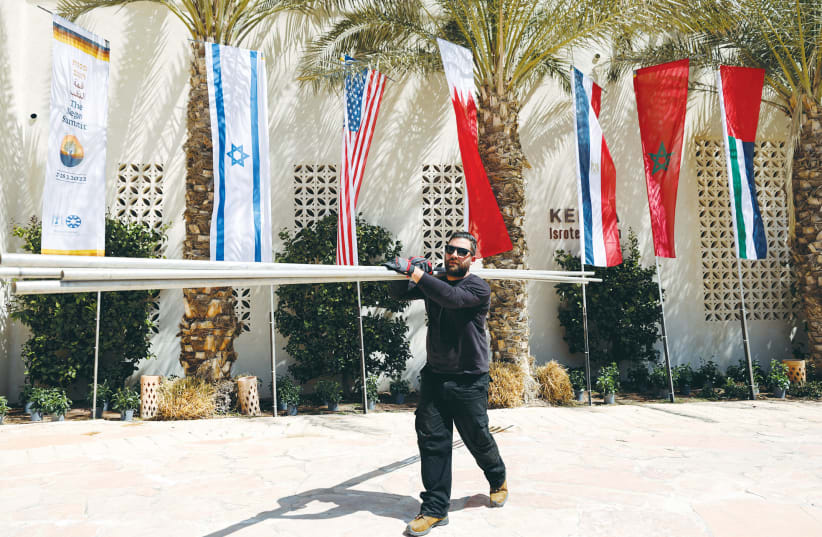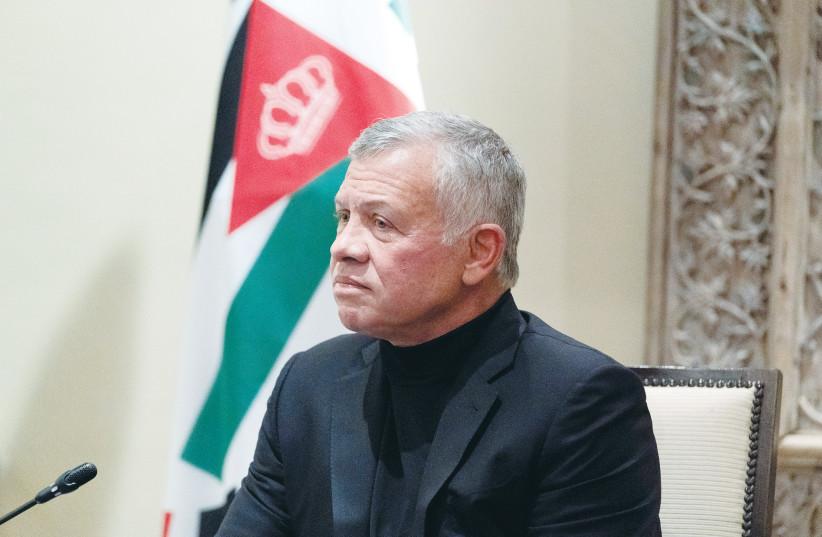Recent reports have indicated that Israel and several Arab states are growing closer in terms of defense ties. A report at The Wall Street Journal claimed that Israel and “Arab military chiefs” held a “secret” meeting relating to air defense and the Iranian threat.
Now Iran’s Fars News, which is considered to reflect the views of the government and the Islamic Revolutionary Guard Corps, has highlighted claims that the Kingdom of Jordan opposes an “Arab-Israel NATO.”
The article quoted Jordan’s Foreign Minister Ayman Al-Safadi as saying that an Israel-Arab defensive alliance was “not on the agenda of US President Joe Biden's visit to the region.” It noted that he told Al-Jazeera in Qatar that "there is no talk of an Arab coalition of which Israel is a part, and there is not even such a plan."
Iran has an interest in Jordan denying these reports. Tehran doesn’t want any kind of coalition of Arab states with Israel working against its plans to undermine regional stability. After all, Iran’s goal is to use Syria as a base against the Jewish state, to hollow out and ruin Lebanon in order to enrich Hezbollah, and to destroy Yemen and Iraq.
Iran’s media say that countries like Jordan want good relations with the Islamic Republic. Meanwhile, it is hoping Qatar will help it broker some kind of new Iranian nuclear deal. Tehran is worried that it could potentially lose out on a new deal and that the US will eventually walk away.
It was also concerned after Jordan’s King Abdullah II said, according to CNBC, that he would support the formation of a Middle East military alliance similar to NATO, and that it could be done with countries that are like-minded. “I’d like to see more countries in the area come into that mix,” the king said. “I would be one of the first people that would endorse a Middle East NATO.”
The Jordan Times noted on June 28 that “Qatari Emir Sheikh Tamim Bin Hamad Al Thani on Tuesday received Deputy Prime Minister and Foreign Minister Ayman Safadi, who delivered a letter from His Majesty King Abdullah to the emir, which stressed keenness to enhance the ‘deep-rooted brotherly’ relations between the countries in a way that positively reflects the interests of both peoples and regional issues.”
The article notes that “they also went over the summit that will bring together the Gulf Cooperation Council (GCC), Jordan, Egypt, Iraq and the US in Saudi Arabia in July, stressing the importance of coordinating Arab positions before it is held.” This means that Jordan is seeking to have a successful summit this month with other Arab states.
Egypt, Iraq and Jordan have been increasingly working together. In addition, the US is brokering an energy deal that may see Egyptian gas and electricity from Jordan go through Syria to Lebanon. At the same time, Iraq’s prime minister recently met his Saudi counterparts and went to Iran.
Things are moving in the Middle East
Clearly, many things are moving around in the Middle East. On Monday, Foreign Ministry Director-General Alon Ushpiz participated in the Negev Summit’s Steering Committee in Manama, the capital of Bahrain, with the participation of senior representatives of the foreign ministries of Negev Forum members Israel, Bahrain, the US, the United Arab Emirates, Egypt and Morocco.
This shows that there is an emerging relationship between key states in the region. The US, Israel, Bahrain and the UAE have also carried out a naval exercise in the Red Sea. The US is expanding its role in the Red Sea via NAVCENT, the naval component of Central Command. CENTCOM senior level officers have also been to Israel to observe recent military drills.
For Iran then, the real story is that regardless of its focus on Jordan, it knows that Israeli cooperation with some Arab states is growing. But Tehran has its own friends in the region as well, and knows that a real “Arab-Israeli NATO” likely won't emerge. Even so, it also knows that there are real outcomes from the current rapidly expanding relationship between Israel, the US, Bahrain, the UAE and other states.
Iran’s agenda in the region – to hollow out and weaken Iraq, Yemen, Syria and Lebanon – is not a system that appeals to countries that are willing to work with the Islamic Republic.
Jordan, Egypt and Qatar may be open to Iran, and even the Saudis are working on reconciliation – but none of them want the Iranian system that is imposed on Baghdad to harm their security. Similarly, Turkey wants to work with Iran on some issues, but doesn’t want to be harmed by the chaos that the Iranian regime is spreading.

